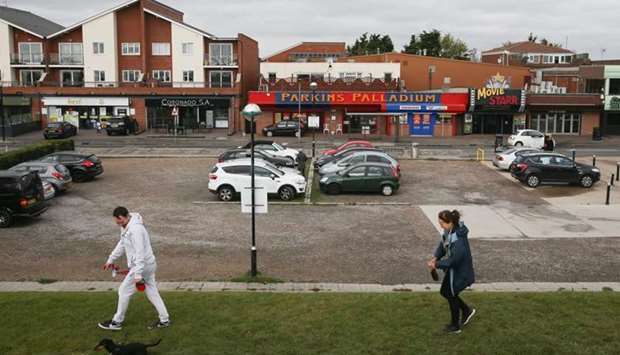Just 40,000 people live on Canvey Island in Essex, a 40-minute train ride from London but a world apart from the British capital.
"We are surrounded by sea, I suppose it gives us that feeling of independence," said Edward Parkin, 39, who works at the waterfront arcade Parkins Palladium.
Just two roads connect the area to the mainland and there has been resentment that decisions are being taken on the other side of the water which affect the community.
"It is always the mainland that decides. People are fed up," said Dave Blackwell, whose frustration with the situation led him to create the Canvey Island Independent Party (CIIP).
The latest move seen as unacceptable by Blackwell is a proposal to turn a community centre into housing, following a decision by Castle Point borough council -- which governs Canvey.
The septuagenarian has announced a petition on independence and, inspired by Catalonia, a referendum for Canvey to separate from Castle Point and run its own affairs.
"If we'd have a referendum tomorrow, 80 percent of the people would be in favour of independence," he said.
Islanders have already tested their breakaway views at the polls, with the area voting by 72.7 percent in favour to leave the European Union in last year's referendum -- one of the highest proportions in the country.
Blackwell, who started his party 14 years ago, sees his ongoing bid for independence as similar to Brexit.
"We have done campaigning for independence in the past. It grew," he said.
"People are fed up with mainstream parties and want to be able to determine their own future."
Nine out of the 11 Canvey Island town councillors have already been convinced to join CIIP, along with 15 of 17 councillors representing the island in Castle Point council.
But the leader of Castle Point council, Colin Riley, is firmly against the idea and argues the talk of separatism is taking away from the "wonderful sense of community" within the area.
"At a time when all councils are facing increasing pressures on budgets and are looking at ways of working together it would be contrary to promote independence for Canvey island," he told AFP.
"I am hopeful that we can quickly get back to business."
Money for the island
On Canvey Island, however, residents are already coming up with ways to spend the council's budget if autonomy is returned.
Ideas include a third road to the mainland to relieve congestion, a new drainage system to protect the island from flooding, or more toilets along the beachfront.
Dave Taylor, tucking into a plate of bacon and mushrooms on toast at Sue's Cafe, told AFP independence "would be a very good idea".
"The money will be spent on the island, not elsewhere," said the 74-year-old, noting unhappily that it was left to volunteers to clean Canvey's beach and repair the island's benches.
Cafe owner Sue Thomas, donning a blue apron, agreed: "I think it might be a good thing for the people of Canvey; they could make decisions for themselves and have a say."
It has been more than 40 years since the creation of Castle Point borough council, in 1974.
Blackwell believes the case of Catalonia could act as a catalyst for change.
"They want self-determination like we do," he said of Catalans, who earlier this month held their own independence referendum.
Blackwell thinks it unlikely that if Canvey holds its own vote, locals will face the same crackdown by authorities seen in Catalonia.
"We won't get the riot police come to Canvey Island, that's for sure."
While the outcome for separatists in Catalonia and Canvey remains uncertain, Blackwell is at least grateful to his distant southern neighbours for giving his community a boost.
"Nobody could put Canvey Island on the map before. Now they do," he said.

